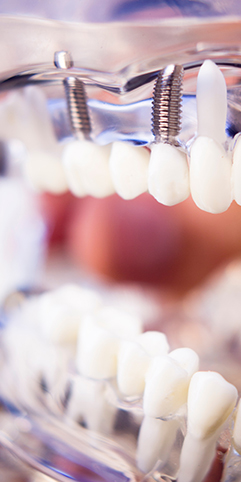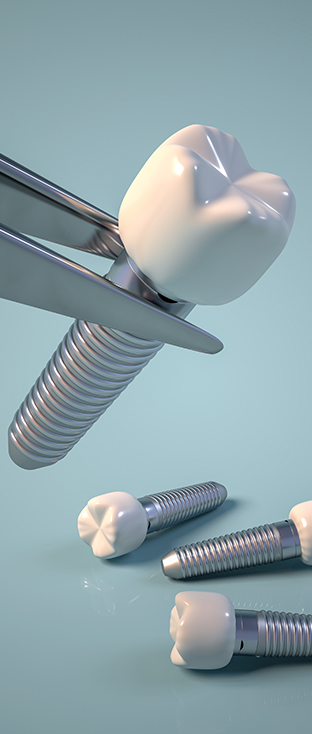Whether you are looking to replace a single tooth or multiple missing teeth, implants allow you to regain look, feel and function with stable and supported replacements for life.
Implants use advanced dental technology to create a fixed new tooth root, with a titanium post placed into the jawbone to support a crown or bridge. Titanium is very well tolerated by the body and therefore the new root fuses to the surrounding bone in the jaw to create a solid foundation.
If you are missing a tooth, whether through accident, injury or decay, it can be replaced with a crown fitted to a single implant. The replacement tooth is strong, secure, looks just like your existing teeth and is able to withstand pressures from chewing. The single implant can be fitted with no damage to the remaining healthy teeth, prevents any unwanted movement and provides added strength to the jaw. Put simply, it is the most effective option available for replacing a single tooth.
We can now use dental implants to replace a full upper or lower arch of missing teeth. Dentures have always been the preferred option for this, but they can be uncomfortable and unstable to wear, despite modern advancements. Dental implants are seen as a superior alternative, with two full arch options available.
Fixed full arch - four or six precisely planned and placed dental implants are used to support a full arch bridge of new teeth. Once settled and healed, the new teeth feel completely natural and allow you to speak and eat as before.
Implant-supported denture - we can use implants to stabilise a denture and anchor it into place. When supported in this way, dentures feel much more secure and do not move when worn, giving you back the confidence to smile and speak freely again.




Implants will not become loose over time, or slip when you are eating or speaking, an important consideration for many. As they are held in place by your bone, you can be confident of their strength.
Implants are a well-established, safe and very effective dental restoration, able to replace missing teeth in any part of your mouth.
As well as completing your smile, implants help support your facial structure and remaining teeth. They also protect the gum and have no detrimental effect on your existing healthy teeth.
Implants not only feel and function like natural teeth, but completely look the part too. They fit perfectly into your smile, with many people unable to tell the difference.
Dental implant treatment can be quite lengthy, with several appointments needed to achieve the final result. It will be worth it in the end, when you are showing off your beautiful new smile!
At your initial consultation, we carry out a full examination and ensure that you are suitable for implants. We develop your treatment plan and discuss this with you in detail, including estimated costs and timeframe.
In some more complex cases, there may not be enough density in your jawbone to support an implant, so we may suggest performing a bone graft or adding more soft tissue before treatment begins.
Our state-of-the-art digital technology enables us to precisely plan the best position for your implant. We use local anaesthetic to ensure you are comfortable before placing the titanium implant into your jaw.
The implant takes around 3-6 months to heal and fully fuse to the bone, forming a solid foundation. We fit a temporary tooth to protect your gum during this healing process.
Once your implant is fully healed, we fit your final tooth to complete your smile and conclude your implant treatment. We ensure you are happy with your transformed smile and give some tips and advice on how to look after your implant to keep it problem-free for the long term.
You may actually find it easier! As your implants are fused to your jawbone and the replacement teeth securely supported, you shouldn’t have any trouble speaking and may find your speech becomes clearer once the gap in your teeth has been filled.
Dental implants are titanium posts surgically implanted into the jawbone beneath the gums, serving as the roots of missing teeth. Once in place, they allow your dentist to mount replacement teeth onto them. Dental implants are used because they provide stable support for artificial teeth and are the closest you can get to simulating the look, feel, and function of natural teeth. They are used for people who have lost teeth due to injury, disease, or decay and are looking for a long-term solution.
Dental implants offer several advantages over tooth replacement options like dentures or bridges. They provide better stability and do not shift or slip in the mouth, making eating and speaking easier. Implants also help preserve the jawbone and prevent bone loss when teeth are missing. Unlike bridges, implants do not require reducing other teeth, which helps preserve more of your natural tooth structure. Additionally, implants are designed to last many years and can be cost-effective when considering their longevity.
Most adults in good general health and have adequate bone in their jaw to support an implant can be considered for dental implants. Patients should have healthy gums and be free from periodontal disease. Chronic illnesses, such as diabetes or leukaemia, may interfere with healing after surgery and may make implants less successful. Smokers or those with poor oral hygiene may also have diminished success rates and are generally advised to quit smoking or improve their dental care routines before undergoing the implant procedure.
Getting dental implants involves several steps and usually takes a few months. First, a detailed evaluation, including dental exams, X-rays, and sometimes 3D imaging, is conducted to plan the implant placement. The implant surgery involves placing the titanium post into the jawbone, followed by a healing period (osseointegration) where the bone grows around the implant to secure it. This can take several months. Once the implant has bonded with the jawbone, an additional post (abutment) is placed on the implant to hold the new tooth, and finally, the artificial tooth (crown) is attached.
Most people who have received dental implants say minimal discomfort is involved in the procedure. Local anaesthesia can be used during surgery; most patients report that implants involve less pain than a tooth extraction. After the dental implant, mild soreness can be treated with over-the-counter pain medications such as ibuprofen.
Dental implants are designed to be a long-term solution and can last many years when properly maintained. With good oral hygiene and regular dental check-ups, implants can last a lifetime. The crown attached to the implant generally lasts about 10 to 15 years before it may need replacement due to wear and tear.
Caring for dental implants is similar to caring for natural teeth. It involves brushing at least twice daily, flossing daily, and using an antimicrobial mouthwash to help prevent infection at the implant site. Regular dental check-ups and cleanings are also crucial. Avoid chewing hard items like ice or hard candy that could damage the crown and the implant.
The risks associated with dental implants include infection at the implant site, damage to surrounding teeth or blood vessels, nerve damage which can cause pain or numbness, sinus problems when implants placed in the upper jaw protrude into sinus cavities, and implant failure due to rejection or mechanical problems. However, these risks are relatively low, and implants have a high success rate when performed by experienced dentists.
Once dental implants are placed and artificial teeth are mounted, they look and feel like your own teeth. Because implants integrate into the structure of your bone, they prevent the bone loss and gum recession that often accompany bridgework and dentures. No one will know you have implants unless you tell them.
The cost of dental implants can vary widely depending on the number of implants needed, the location of the implants, and other related surgical issues. Dental implants are more expensive upfront than other tooth replacements but offer better long-term value.
We’re here when you need us. Flexible opening hours for your convenience.
We are closed for lunch between 13:00 - 14:00 Monday to Thursday and 12:00 - 12:30 on Fridays.